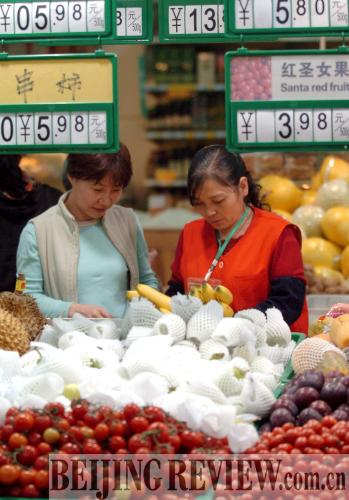|
 |
|
CONSUMPTION BOOM: A shopper buys produce from a grocery store. By handing out generous incentives, the Chinese Government is spurring the consumer market (LIU JUNXI) |
Even during the worst periods of the financial crisis, the relatively insular economy of China was widely viewed as a calm port in the sweeping storm. But few expected it to shake off the economic doldrums so soon. While the majority of the economic powers are still mired in recessions or are only beginning to show signs of improvement, China is already engaged in a speedy recovery.
The gross domestic product of the world's third-largest economy grew a robust 8.9 percent in the third quarter, accelerating from 7.9 percent during the April-June period and just 6.1 percent in the first three months of this year, the Chinese National Bureau of Statistics (NBS) said at a press briefing on October 22. Though well below the turbo-charged growth rate China previously enjoyed, the progress should still be the envy of the recession-weary world.
Upbeat sentiment proliferates as tens of thousands of laid-off workers are being rehired and the stock market begins a much-anticipated upward movement. With a strong display of economic resilience, economists now believe China is on track to easily overtake its target of an 8-percent growth for 2009, a goal that had previously existed only as a distant hope and not a financial reality.
"The rosy figure is painting a clear picture that the economy is breathing a sigh of relief after several nervous months," Guo Tianyong, a senior economist with the Central University of Finance and Economics, told Beijing Review.
By implementing stimulative economic policies and repairing its damaged growth engine, China has made good on its promise that the near future will witness a substantial turnaround, he added.
An investing spree
At the heart of the recovery is the infrastructure-weighted stimulus package funded by a deluge of bank lending. The prime pumping has kept the industrial sector humming, added luster to the bleak employment landscape and provided a floor under what would otherwise have become a deeper economic sinkhole. From January to September, investments in fixed assets soared by a whopping 33.4 percent, 6.4 percentage points higher than the same period last year. For the first nine months of 2009, foreign direct investment (FDI) fell 14.2 percent to $63.8 billion. But in September alone, FDI rose 18.9 percent from a year earlier to $7.9 billion, according to the Ministry of Commerce.
As China continues to hinge its fortunes on investments, analysts fear that the country may begin to drag its feet in the long-needed structural shift that will redirect the economy toward consumption. Once the government stimulus wears off, any contraction in investment might hinder domestic demand growth, analysts agree.
Another side effect of the investment increase is the looming overcapacity dilemma in steel and cement industries that are feeling the strains of market saturation. Overall, however, the industrial output nationwide increased 12.4 percent in the third quarter from a year earlier, said the NBS.
The woes are likely to subside as the government implements policies against the operation and startup of new factories, melting plants and polluting projects, Zuo Xiaolei, chief economist with the China Galaxy Securities Co. Ltd., told Beijing Review. But it is still necessary to attract more investments from the private sector, she said.
"With more capital available and a brighter profitability outlook on the horizon, there is no reason for private companies not to step up investments," added Zuo.
Since repairing the social safety net and lowering savings rates will take additional time, the job of sparking consumption has been placed mostly in the hands of powerful policy incentives. The auto market, for instance, has been burning hot on back tax breaks and subsidies for rural buyers. The buying fever had even left some dealerships short of vehicles to sell. Retail sales nationwide in the third quarter rose a dizzying 15.1 percent year on year, or 17 percent after deducting price factors.
Healing exports
The NBS said exports contracted 15.2 percent year on year in September, an improvement from the 23.4-percent drop in August and the slowest monthly rate of decline experienced this year. Foreign consumers have clung tight to their paychecks in the wake of the crisis, preparing China's export sector to gain ground as the financial crisis abates.
"The export performance will be much better in the months to come. There are some rush orders coming to China for Christmas, so I expect a pretty sustainable and accelerating turnaround in November and December," said Tao Dong, a senior economist with the Credit Suisse First Boston in Hong Kong.
| 